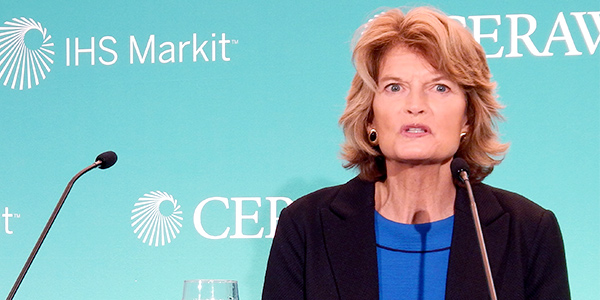By Tom Kleckner
HOUSTON — Sometime in the future, pigs may fly, the moon might turn blue and bipartisanship could break out in D.C. Until then, there’s the Senate Energy and Natural Resources Committee (ENR), led by Chair Lisa Murkowski (R-Alaska) and ranking member Joe Manchin (D-W.Va.).
“We like each other. Being a Democrat and a Republican does not interfere with our job,” Manchin said during an appearance at the CERAWeek by IHS Markit energy conference Monday. “We represent our states and do what’s best for the country.”
“I always wonder when did energy become a partisan issue, and why does it have to be partisan? It used to be a regional issue,” said Murkowski, who has chaired or served as the committee’s ranking member for the past 10 years. “I like to think we can show the leadership in Congress that we should be working together in key areas.”
“Stand down on the rhetoric,” she continued. “I want to set a tone that is bipartisan, that is welcoming … where there is a safe space for dialogue that leads to pragmatic solutions.”
Murkowski and Manchin appeared together on a CERAWeek panel days after publishing an op-ed in The Washington Post that called for “responsible” action on climate change. “There is no question that climate change is real or that human activities are driving much of it,” they wrote, taking a position their constituents might consider heresy.
The op-ed was a follow-up to the ENR Committee’s hearing on climate change last week. (See Senate ENR Committee Discusses Climate Change.)
The column did not mention Manchin’s staunch support for West Virginia coal mining, nor Murkowski’s backing of oil drilling in the Arctic National Wildlife Refuge, policies that contribute to carbon emissions. Nor did it make any concrete policy proposals. They suggested only that the solution to climate change is unleashing American ingenuity, saying that the U.S. “must continue to lead the world in the development of new and improved technologies.”
“If we’re going to talk the talk about how we innovate our way to a lower-carbon economy, let’s make sure we facilitate and foster these really great ideas,” Murkowski said, referring to CERAWeek’s exhibit halls filled with the latest in energy technology. “It’s like dream stuff out there. This is what we need to advance a lower-carbon economy. Is it the government’s role to take every great idea and underwrite it? Absolutely not, but we can wisely help facilitate their development.”
President Trump’s proposed 2020 budget would cut funding for the Department of Energy’s Office of Energy Efficiency & Renewable Energy (EERE) by 70% and eliminate the Advanced Research Projects Agency–Energy. Congress rejected similar proposals last year.
“We come from communities with challenging environments. We have to reduce emissions in a way that does not leave the community worse off,” Murkowski said. “Let’s try to dial down some of the rhetoric out there. Let’s stop the messaging and the name-calling and the finger-pointing. Instead, let’s decide what are some of the paths forward.”
Manchin said coal and other fossil fuels still need to be part of the energy mix. “You’re not going to eliminate fossil fuels, so you better find the solution or next generation. There has to be a balance,” he said.
Murkowski and Manchin both took shots at the proposed Green New Deal. Manchin referred to the resolution as a position statement, while Murkowski bemoaned its use as a political wedge. Senate Majority Leader Mitch McConnell (R-Ky.) intends to put the measure up for a vote to get the Senate on the record.
The Green New Deal has “created even more of a divide when we should be coming together to address the problem,” Murkowski said. “Now is not the time to put everyone in their corners and have them come out fighting with rhetoric. I find it distracts from the solutions. If you don’t like the Green New Deal, what is your plan?”
During both his press briefing and panel appearance, Manchin referred to a competing op-ed penned for CNBC by former Energy Secretary Ernest Moniz, who served under President Barack Obama, and Andy Karsner, who headed EERE during George W. Bush’s administration. Moniz and Karsner refer to a “Green Real Deal” that ensures a “wise and just transition to a low-carbon economy” and minimizes “stranded physical assets … workers and communities.”
“They say we’re not getting there as fast as we want, but we’re getting there as fast as we can politically,” Manchin said.
Murkowski worked for years with former ENR ranking member Maria Cantwell (D-Wash.) to craft a new energy policy to update the last sweeping energy bill, the Energy Policy Act of 2005.
“The energy bill is coming; we have not given up that,” Murkowski said. “When you think what has happened in the energy space, with LNG terminals, renewables, batteries … when you think how much we’ve done and how we’ve done it with the anchor of policy that hasn’t been enacted … there’s so much that is not fresh.”
But this time may be different, Murkowski said.
“You’re seeing others, not just Democrats, opening up the conversation, which you didn’t see five years ago,” she said. “How we move forward with it is going to be important. We’re putting together a conceptual plan. Saying you’re either for this or you’re part of the problem, that’s not the way to get started.
“The more we push people off in either lane here, it will be hard for people to get to the center to come up with solutions that gain political support. Let’s be practical about this.”






